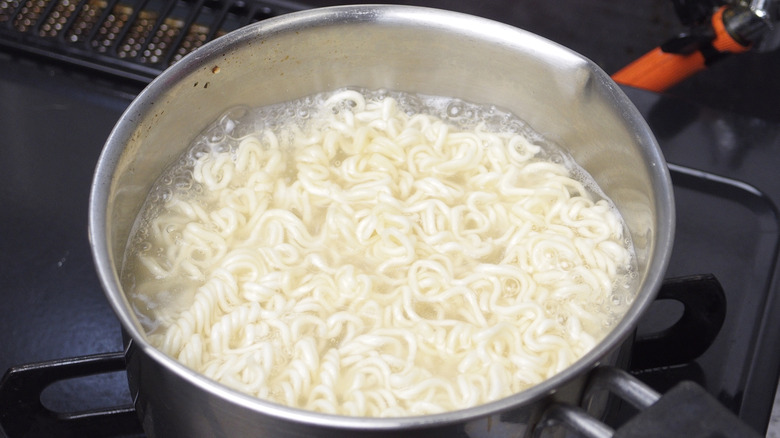You're Probably Overcooking Instant Ramen Noodles
You've probably seen at least one hack to upgrade your instant ramen by now. Social media is full of ways to level up these budget-friendly noodles, including a stir-fried version that involves brown sugar, soy sauce, and Trader Joe's Everything But the Bagel Seasoning, and the creation of a creamier broth using mayo, garlic, and a raw egg. But the most impactful tip of all may not involve adding extra ingredients; in fact, just a simple adjustment to how you cook your noodles can make all the difference.
Besides being notoriously cheap, instant ramen is famous for cooking in as little as three minutes, making it a favorite of novice cooks and college students who are short on time. Depending on the brand, the directions on the package state to boil water, and then add the noodles and the flavoring components together or add the seasoning packet only after the noodles are cooked.
Regardless of which type of instant ramen you prefer, there are endless ideas for customization, but when it comes to cooking the noodles, most people follow the standard instructions without a second thought. But could veering off from these steps actually improve the taste of your instant ramen?
Cook your instant ramen al dente
To make your instant ramen even more delicious, cook it like you would spaghetti, and leave the noodles a little al dente. You won't be pulling them off the stove much earlier than the instructions dictate. Chef Roy Choi's recipe for "Perfect Instant Ramen" in NYT Cooking recommends cooking the noodles for two minutes, then adding in the seasoning packet and cooking for an additional 30 seconds.
But you don't have to follow exact times if you don't want to. Hiro Mitsui, executive chef and founder of Japanese restaurant Ramen by Uzu, told Refinery29 that he simply stops cooking his ramen as soon as it reaches the consistency he wants. "It's a little closer to traditional ramen noodles, and not as mushy!" he explained.
Since ramen noodles cook so quickly, it's pretty easy for them to go from chewy to soggy. That's why Japanese people typically eat ramen as quickly as possible. If the noodles are left to sit in the hot broth for too long, they continue cooking and become too soft.
But if you want to take your time, you can also try rinsing the noodles in cold water as soon as they're al dente. They'll stop cooking immediately, and you can later drop them into a separately made broth.

